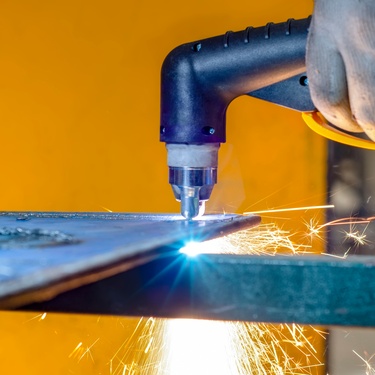
Plasma cutters are common tools in metalworking and other manufacturing jobs. Like any other industrial tool, plasma cutters are inherently dangerous to use. Here, we’re going to focus on the electrical safety of plasma cutters. Specifically, we will review whether they can shock you, as well as provide facts and advice to protect your safety on the job.
What Is a Plasma Cutter?
A plasma cutter is one of the many different types of metal-cutting tools, designed to slice through conductive metals like steel, aluminum, and brass using ionized gas (plasma). The device generates an electric arc, heating compressed air to incredibly high temperatures. This ionized gas blasts through metal as molten material to produce clean, precise cuts.
The underlying process relies on electricity to ionize the gas and sustain the plasma arc. This makes plasma cutters highly powerful tools, but it also introduces potential hazards, including the risk of electric shock, if workers ignore proper precautions.
Can a Plasma Cutter Shock You?
Yes, a plasma cutter can shock you under certain conditions. While the tool operates at lower direct voltages than typical welding equipment, it requires high frequencies and electrical currents to ignite and maintain the plasma arc. If the operator becomes part of the electrical circuit, there is a risk of shock.
Several factors can increase this risk, such as poorly maintained equipment, insufficient grounding, or using the cutter in wet or humid environments. Additionally, damaged cables, exposed wires, or wearing inadequate protective gear can further heighten the chance of an accidental shock.
Advice for Staying Safe
To prevent accidents, follow key safety protocols when operating a plasma cutter. Always inspect your equipment before use, checking for damaged cables or worn components. Ensure the cutter is properly grounded, as grounding is essential in preventing electric shock. Next, establish a dry work environment, avoiding any contact with water or damp surfaces, which can conduct electricity.
Wear personal protective equipment (PPE) such as insulated gloves, flame-resistant clothing, and a face shield. These items not only defend you against electric shock but also protect against burns, UV injury, and flying debris.
Lastly, be cautious. As is the case with all industrial equipment and tools, their heavy-duty applications entail high user risk. Follow proper procedures, perform each job slowly and meticulously, and know how to respond to an emergency should one occur.
Plasma cutters are invaluable tools in the welding and metalworking professions, but safety remains a critical concern. You should understand the electrical shock risks and take steps to protect yourself.
Bio: Casey is a passionate copyeditor highly motivated to provide compelling SEO content in the digital marketing space. Her expertise includes a vast range of industries from highly technical, consumer, and lifestyle-based, with an emphasis on attention to detail and readability.
